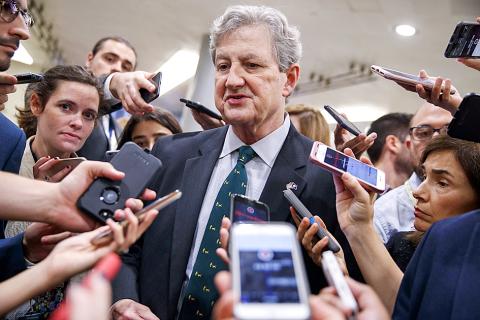Several US congressmen on Friday said that Beijing should be reprimanded for threatening Taipei with military power following Chinese President Xi Jinping’s (習近平) reiteration this week of his goal of unification and willingness to use force to annex Taiwan.
“China threatening Taiwan with military force is reprehensible, counterproductive and just bad diplomacy,” US Senator John Kennedy tweeted.
China’s provocative approach toward Taiwan risks the stability of the region and displays its disrespect of democracies, Kennedy said.

Photo: EPA-EFE
US Representative Mario Diaz-Balart on Twitter called China’s attempts to threaten a democratic US ally “shameful,” saying that communist dictatorships often rely on coercion, threats and violence to maintain power.
“The Chinese people in the PRC [People’s Republic of China] have suffered under crushing oppression for far too long, and the threats against the free people of #Taiwan must end,” said Diaz-Balart, who serves as cochair of the Congressional Taiwan Caucus.
US Representative Steve King said on Facebook that China’s saber-rattling and threats against Taiwan, a democratic ally and an important trading partner, should be condemned by freedom-loving people around the globe.
Taiwan and China are sovereign nations with a right to self-determination, US Representative Paul Gosar said, adding that force should not be an option.
The congressmen were commenting on Xi’s speech in Beijing on Wednesday marking the 40th anniversary of a policy statement that paved the way for cross-strait interactions.
The Chinese leader said that while peaceful unification is his government’s goal, it “makes no promise to abandon the use of force” against the intervention of foreign forces and pro-independence “separatists.”
Xi also said he planned to explore a Taiwan version of the “one country, two systems” model, which President Tsai Ing-wen (蔡英文) in a speech responding to Xi’s remarks later that day said would not be accepted by Taiwanese.
Calling for US support for Taiwan, US Representative Don Bacon on Wednesday tweeted that Taiwan has embraced democracy and human rights for all its citizens.
“America needs to stand by our longstanding commitment to Taiwan and ensure they’re not isolated while China still embraces Communism, and denies freedom of religion, speech, and the press,” Bacon said.
US Representative Vicente Gonzalez also urged the US to stand with Taiwan, which he called a key democratic ally and friend.
Gonzalez and US Representative Andy Biggs expressed the hope that both sides of the Taiwan Strait could return to having peaceful and constructive dialogue and relations.
US Representative Glenn Grothman said China should respect the commitment of the 23 million Taiwanese to freedom and democracy, while US Representative Ted Yoho pledged the US Congress’ “unwavering support” for Taiwan.
“Xi Jinping’s threatening rhetoric on #Taiwan is an escalation of Communist Party campaign to marginalize Taiwan’s democracy,” Yoho said, adding that Taiwan’s legitimacy is a self-evident fact.
The Ministry of Foreign Affairs yesterday thanked the nine US senators and representatives for their staunch, bipartisan support of the nation.

The CIA has a message for Chinese government officials worried about their place in Chinese President Xi Jinping’s (習近平) government: Come work with us. The agency released two Mandarin-language videos on social media on Thursday inviting disgruntled officials to contact the CIA. The recruitment videos posted on YouTube and X racked up more than 5 million views combined in their first day. The outreach comes as CIA Director John Ratcliffe has vowed to boost the agency’s use of intelligence from human sources and its focus on China, which has recently targeted US officials with its own espionage operations. The videos are “aimed at

STEADFAST FRIEND: The bills encourage increased Taiwan-US engagement and address China’s distortion of UN Resolution 2758 to isolate Taiwan internationally The Presidential Office yesterday thanked the US House of Representatives for unanimously passing two Taiwan-related bills highlighting its solid support for Taiwan’s democracy and global participation, and for deepening bilateral relations. One of the bills, the Taiwan Assurance Implementation Act, requires the US Department of State to periodically review its guidelines for engagement with Taiwan, and report to the US Congress on the guidelines and plans to lift self-imposed limitations on US-Taiwan engagement. The other bill is the Taiwan International Solidarity Act, which clarifies that UN Resolution 2758 does not address the issue of the representation of Taiwan or its people in

US Indo-Pacific Commander Admiral Samuel Paparo on Friday expressed concern over the rate at which China is diversifying its military exercises, the Financial Times (FT) reported on Saturday. “The rates of change on the depth and breadth of their exercises is the one non-linear effect that I’ve seen in the last year that wakes me up at night or keeps me up at night,” Paparo was quoted by FT as saying while attending the annual Sedona Forum at the McCain Institute in Arizona. Paparo also expressed concern over the speed with which China was expanding its military. While the US

SHIFT: Taiwan’s better-than-expected first-quarter GDP and signs of weakness in the US have driven global capital back to emerging markets, the central bank head said The central bank yesterday blamed market speculation for the steep rise in the local currency, and urged exporters and financial institutions to stay calm and stop panic sell-offs to avoid hurting their own profitability. The nation’s top monetary policymaker said that it would step in, if necessary, to maintain order and stability in the foreign exchange market. The remarks came as the NT dollar yesterday closed up NT$0.919 to NT$30.145 against the US dollar in Taipei trading, after rising as high as NT$29.59 in intraday trading. The local currency has surged 5.85 percent against the greenback over the past two sessions, central